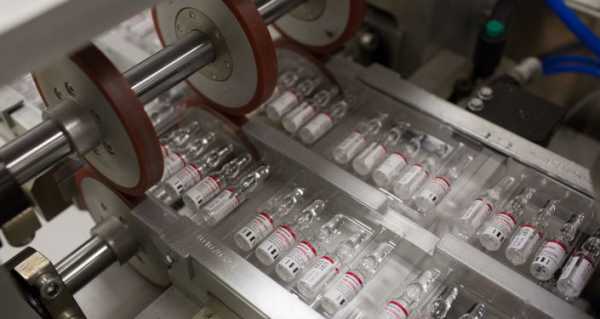
Leading international scientific journal The Lancet has published the results of the first two stages of clinical trials for the Russian COVID-19 vaccine.
Sputnik has spoken to the vaccine developers at the Gamaleya Centre, Alexander Gintsburg and Denis Logunov, as well as the CEO of the Russian Direct Investment Fund Kirill Dmitriev, to find out what data the article cites and why it is so important for the global scientific community.
Today, less than a month after the Sputnik V COVID-19 vaccine was registered, the world’s most influential scientific journal The Lancet has published the results of the first two stages of clinical trials, so highly-anticipated by both the Russian and international scientific community.
The article responds to foreign criticism and provides long-awaited clarity. The Russian scientists’ development, which turned out to be the world’s first registered coronavirus vaccine, is not only effective but safe.

World’s first coronavirus vaccine
Start of a Series of Publications
The Lancet has published the results of the first two stages of clinical trials and, according to the vaccine developers at the Gamaleya Centre, this is going to be the first step towards a series of publications about the Sputnik V vaccine in scientific journals.
‘Vaccine With Proven Safety’
The Sputnik V vaccine’s safety is one of the main conclusions cited in the article. According to the first and second-stage clinical trial results, the scientists didn’t find any serious adverse effects from the vaccine regarding any of the evaluated criteria. Not all candidate vaccines can boast of such results, some have noted up to 25% experiencing serious adverse effects.
Long-Term Immunity
The Lancet also cites scientific evidence of the Sputnik V vaccine’s effectiveness. For example, evidence of the treatment’s ability to launch a long-term immune response to the coronavirus in 100% of those vaccinated due to its unique two-stage introduction technology. According to Denis Logunov, deputy research director at the Gamaleya Centre, a humoral and cellular immune response, which is enough to protect a person from COVID-19, has been observed in 100% of those vaccinated.
Scientists at the Gamaleya Centre confirm that in the context of Sputnik V clinical trials, all of the volunteers developed T-cell immunity, represented by both CD4+ and CD8+ cells, making it possible to recognise and destroy coronavirus-infected cells.
‘The Vaccine Will Work in 100% of Cases’
One of the scientific community’s biggest fears regarding the use of human adenoviral vector vaccines — the technology used in Sputnik V — was the pre-existing immunity to adenoviruses in some people.
In other words, there was a concern that our immunity might not allow the required amount of human adenovirus into the body. This serves as a kind of “taxi” in the vaccine, delivering the outer shell genetic material of the coronavirus into the cells (it’s important that the coronavirus itself doesn’t enter the body with the vaccine, which completely eliminates the possibility of infection).

A scientist works inside a laboratory of the Gamaleya Research Institute of Epidemiology and Microbiology during the production and laboratory testing of a vaccine against the coronavirus disease (COVID-19), in Moscow, Russia
Due to people often getting sick with adenoviruses (like the common cold), they could have developed immunity, which theoretically could reduce the adenovirus vaccine’s effectiveness. However, the results of the trials presented by the Gamaleya Centre scientists prove otherwise: pre-existing immunity doesn’t affect the vaccine’s effectiveness.
According to the representatives of the Gamaleya Centre, what is meant by unverified platforms are developments of some Western companies, that started out of concerns regarding human adenoviruses. Some of these developments, such as mRNA technology (Moderna’s vaccine) or chimpanzee adenovirus (AstraZeneca’s vaccine), have never been used to create registered vaccines.
Such drugs need long-term testing because of concerns regarding their effect on the body’s reproductive functions or the possible high carcinogenic properties that lead to cancer, the centre concluded.
In the article, Russian scientists refer to studies about the safety of the platform on which the Sputnik V vaccine is based.
Unique Two-Vector Technology
According to Alexander Gintsburg, Sputnik V’s unique feature is using two adenoviruses, serotypes 5 and 26, in two separate vaccinations. Today, many experts recognise double vaccination as a factor that can significantly enhance immunity to the coronavirus.
However, if the same vector is used for two vaccinations, the immune system triggers defence mechanisms and begins rejecting the second-injection drug. This problem is solved by using two vectors in Sputnik V, which helps avoid the described neutralising effect.

A handout photo shows an employee demonstrating a vial with “Gam-COVID-Vac” vaccine against the coronavirus disease (COVID-19), developed by the Gamaleya National Research Institute of Epidemiology and Microbiology and the Russian Direct Investment Fund (RDIF), during its production at Binnopharm pharmaceutical company in Zelenograd near Moscow, Russia August 7, 2020
Gamaleya vs AstraZeneca
Responding to criticism about the insufficient number of volunteers for the two-vector vaccine, the scientists recalled that they managed to test this system on a wider range of people than, for example, one of the leading vaccine candidates, AstraZeneca, did.
The British pharmaceutical giant used four times fewer volunteers during the first two trial stages to determine their two-vector vaccine’s effectiveness.
‘The Only Safe Technology’
Last week, the US Food and Drug Administration announced the possible use of accelerated registration for vaccine candidates due to the current epidemiological situation, without a third phase of clinical trials on tens of thousands of volunteers.
The British authorities also spoke about the possibility of a similar approach. At the same time, according to these countries’ regulators, accelerated registration will only be possible for vaccines that have already proven their effectiveness and safety.
According to Russian specialists, there are not very many drugs that meet these requirements.
The Lancet Publication is the ‘Final Answer’
Kirill Dmitriev, CEO of the Russian Direct Investment Fund, explained that The Lancet’s publication of the clinical trial results is “the final answer in the round of questions directed against Russia” following the Sputnik V’s registration in August.
Sourse: sputniknews.com






